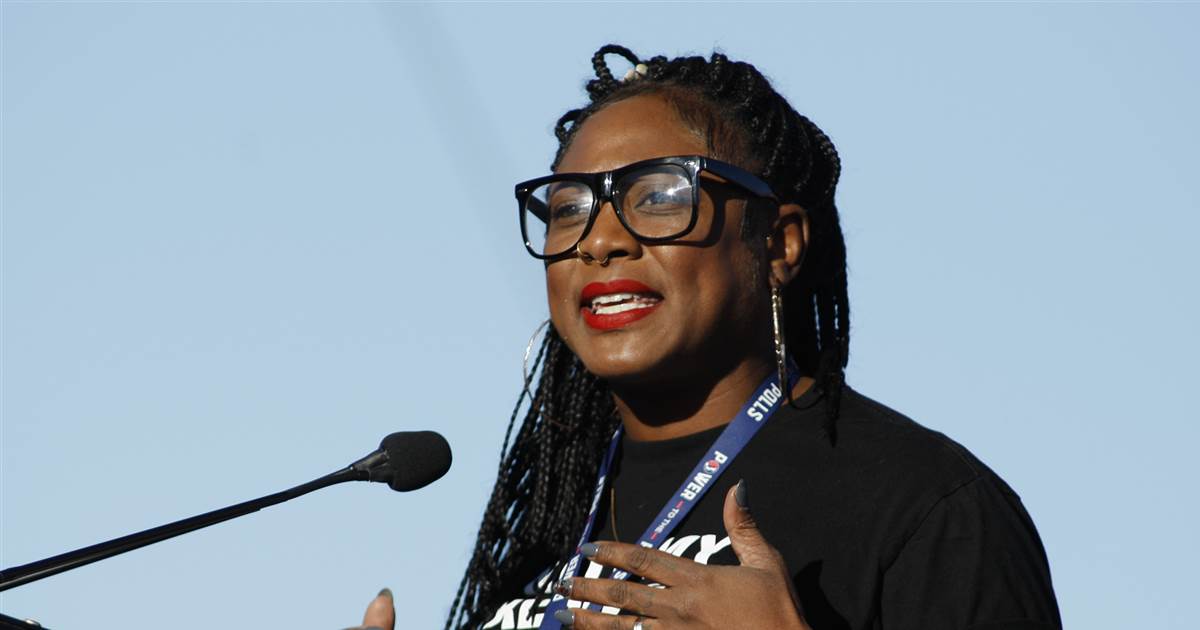Alicia Garza admits the events of 2020 have been anything but typical, no doubt. From COVID-19 raging through the countries’ populations, to the death of George Floyd which ignited global Black Lives Matter protests.
But it is this catalyst she says, that has transformed the socio-political movement she co-founded, Black Lives Matter, to become a change-maker evolving from just a brand on social media and Alicia Garza was never fond of the movement gaining traction online only.
Instead, she prefers to fight for change offline, from the ground up.
The number of people who want to be online influencers rather than do the work of offline organising – knocking on doors, finding common ground, building alliances – depresses her. “Our aspiration should not be to have a million followers on Twitter,” she says. “We shouldn’t be focused on building a brand but building a base, and building the kind of movement that can succeed.”
Her passion is infectious and she is laser-focused on reshaping the socio-political landscape of America into a system of substance.
Founded seven years ago, the story of Black Lives Matter is one of community more than anything else. A community that pushes for a positive agenda for the black American. People criticised that it could alternatively be ‘Black Lives Matter too’ or All Lives Matter because ‘Black Lives Matter’ seems threatening. But the movement doesn’t seek to exclude.
Contrary to its critics’ belief it advocates against incidents of police brutality and all racially motivated violence against black people. In the beginning, gaining traction for the movement was difficult, Alicia says. Today, because of the death of George Floyd the world saw on social media, Black Lives Matter has become a phrase on the lips of many. “Black Lives Matter is now in the muscle memory of many of us,” Garza says. “And it was triggered by watching a man murdered by a police officer, who stared into the camera as he did it.”
Though the BLM Movement has been propelled forward in this way, she also admits the movement has had challenges on the way as well. According to her, BLM is now a term that gets attached to anything related to police violence or black people, Alicia says. She faults that to the movement remaining decentralised.
“It’s hard to build a plane while you’re flying it. The organisation missed opportunities, such as developing clear demands to take on the 2016 US campaign trail. Following eight years of a black president who hadn’t brought as much hope and change as he’d promised, many within the network were disillusioned with electoral politics and focused on direct action instead.”
So once again to mobilise, revolutionise and reform, Alicia Garza launched a new organisation in 2017 that channels the insight she has gained from the BLM Movement into another political movement called the Black Futures Lab.
“Protesting can only get you so far,” she says. Now Garza wants politicians to feel as accountable to black people as they do to corporations. “Our work is purely focused on making sure that Black people are powerful in politics, so that we can be powerful in every aspect of our lives,” she explains.
Reflecting on the progress of the movement she co-founded, however, Alicia has put all her analyses into a book – ‘ The Purpose Of Power: How To Build Movements For The 21st Century.’ Alicia’s book starts with a history of one of the most successful movements of recent times in American history: rightwing conservatism in the US. She argues that, one reason the right has been so powerful, is that it has been very effective at building “networks and alliances and coalitions that all agree on the purpose of power – which is for them to keep it”.
According to her, for the last three decades, the right conservatives have been entrenching their values in the US. One of these values she says is the fact that the right has sustained the idea that success is purely a matter of personal responsibility. The message to poor people has been that it’s their laziness holding them back; the message to black people, that systemic racism doesn’t exist – the problem is their life choices. Worse, “the narrative of personal responsibility for systemic failures has often been used by Black leaders to secure their seat at the table,” Garza writes.
That’s why she questions why black leaders especially today, are symbolised over assessed for substance. The substance they all lack, is the reason she believes the US is in a pit socially and politically.
“People are still looking for the Reverend Dr Martin Luther King Jr when, actually, leadership of movements today looks more like Lena Waithe and Laverne Cox.” Cox is the first openly transgender person to be nominated for a Primetime Emmy award in an acting category, for Orange Is The New Black; Waithe, a queer black writer, actor and producer, won an Emmy for the Netflix show Master Of None. “The things that make us different, those are our superpowers,” Waithe said in her acceptance speech. To Alicia Garza, that’s the substance.
Alicia Garza now advocates for the differences of the people to be the tool that unites and brings about the substance she calls for. And by the way, this comes from a woman who knows a thing or two about differences.
The 39-year-old grew up in Schwartz, a predominantly white suburb in San Francisco with a black mother and a Jewish stepfather and is now married to Malachi Garza, a trans man and activist, who she met in 2003.
Alicia notes that difference can be a source of strength and power. It can give you “potentially more range and insight.” But the NGOs she worked for after graduating from the University of California, San Diego, she says, seemed to have little room for differences. For instance, while the staff were mainly people of colour, those running the show were white. This, she explains, created a struggle. While differences in staff’s backgrounds could help make the organisation better, values from a people’s background, white people being the ones at the top of command, determined the blueprint for the organisations’ operations and culture.
She then moved to more grassroots organisations, fighting for affordable housing in San Francisco’s black communities by building neighbourhood coalitions. This work, she says, changed the way she thought about politics. It was where she began to understand that winning is about more than being right; it’s about inviting people to be part of a change they may not have known they needed.
Lessons from her younger days, and her newfound insight is what she takes with her to work on her new project, the Black Futures Lab where she spends most of her time now. Recently, the Black Futures Lab launched the Black Agenda – a policy platform reflecting “the most common concerns within Black communities across the political spectrum”. One policy point, for example, is raising the minimum wage to $15, a move 85% of respondents to the Black Census supported. Other demands include creating more opportunity for home ownership and limiting police presence in schools, to “dismantle the school-to-prison pipeline”.
Now that a policy platform has been developed, Garza is building support for it ahead of this year’s presidential election. “We’ve had 60,000 Black voters pledging to support the Black Agenda. What [these voters] are saying is that they will be using the agenda as they make decisions about who to vote for.”
With a more centralised and ever focused movement to take care of, Alicia Garza has spent more and more years away from the Black Lives Matter Movement. This is not something she is entirely sad about because to her, it means she can continue doing the grassroots work she always wanted to do to keep moving black people and communities forward.














